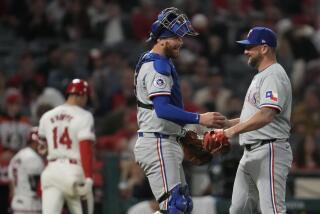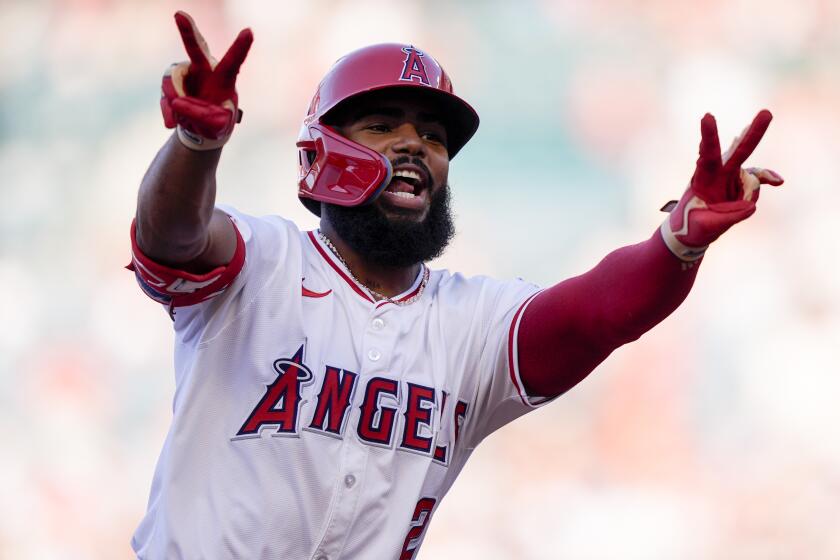SECOND THOUGHTS
- Share via
The beginning of the end for the 1997 Angels did not come when pitcher Chuck Finley fell and broke a bone in his left wrist Aug. 19, or when a foul tip broke a bone in catcher Todd Greene’s right wrist Aug. 20.
No, it all began to unravel in the wee hours of Aug. 10, down the road from Anaheim Stadium, in Room 52 of the Ivanhoe Motel, where Angel leadoff batter Tony Phillips was allegedly looking for a spark of another kind.
The Angels, who closed the season with a 4-0 loss to Texas on Sunday, were in first place in the American League West with a 66-50 record when Phillips was arrested on felony possession of cocaine charges.
But they were never the same after that fateful night when Phillips let down the very teammates, coaches and front-office executives who had built him up as a team leader.
Certainly, the season-ending injuries to Finley and Greene dealt a staggering blow to Angel pennant hopes. But just as the picture of Mark Langston on his back at home plate, staring at the Kingdome roof, is what Angel fans remember about 1995, the lasting image of 1997 will be of Anaheim police officers arresting Phillips “with a loaded pipe in one hand and a lighter in the other.”
Phillips’ 10-day absence--and the whirlwind of controversy in the wake of his arrest--had a profound negative effect on the Angels.
“Our guys tried to handle it as best they could,” Manager Terry Collins said. “But the fact that it was the focus for so long took away from what they were doing on the field.”
Phillips was eventually cleared by baseball doctors to play, but the Angels suspended him Aug. 18, asking him to enter a drug counseling clinic. The union filed a grievance on Phillips’ behalf Aug. 19, and the next day an arbitrator ordered the Angels to reinstate Phillips.
But by then, the Angels had lost eight of 11 games to fall 1 1/2 games behind Seattle, and they found themselves in the middle of a morality tug of war between baseball and the Walt Disney Co., which operates the team.
Disney felt baseball’s drug policy was too lenient. A union official ripped Disney for being more concerned with its reputation as a promoter of wholesome family values than with Phillips. And Phillips blasted both, saying he didn’t want to be used as a “pawn” in a feud over baseball’s drug policy.
By Sept. 11, the Angels had lost 21 of 30 games since Phillips’ arrest, falling 5 1/2 games behind the Mariners and virtually out of the race.
“Everyone was pulling for him to be OK, but when he came back, all of a sudden if we lost, it wasn’t because someone beat us, it was because we were impacted by the Tony Phillips situation,” Collins said.
“As much as you try to forget it, it was the story. Every radio show talked about Phillips. There were endless questions from reporters. That was tough for a lot of guys.”
Phillips, who said club officials have told him he would not be invited back next season, doesn’t think he cost the Angels the division title, but he also won’t argue with those who do.
“I left myself open for that,” Phillips said. “I’ll take the responsibility. . . .
“I’ll take responsibility for the situation I put these other guys into, but good teams overcome controversy. The only things that lose games are when you don’t hit, you don’t pitch and you don’t play good defense.”
Had the Phillips situation been the Angels’ only problem, perhaps they would have pulled out of their slump. But riding piggyback on the arrest were the Finley and Greene injuries, and those combined for a one-two-three punch that knocked the Angels out of contention.
Allen Watson and Jason Dickson, feeling pressured to fill Finley’s stopper role, began to struggle, and knuckleballer Dennis Springer’s surprising run of success finally ended.
Ken Hill, acquired in a July 29 deal from Texas, emerged as the staff ace in late August, but the Angels couldn’t score any runs for him. The clutch hits, so bountiful most of the year, began to disappear.
To compound matters, leadoff batter Rickey Henderson, acquired in an Aug. 13 deal, hit only .183 and Phillips, despite hitting successfully in 25 of 30 games after his return, had very little impact--his average actually decreased, from .279 to .275.
With Chad Kreuter and Gary DiSarcina providing little offense at the bottom of the order, there weren’t many RBI opportunities for Tim Salmon and the heart of the lineup. And without Finley, there was no pitcher who could be counted on to break a losing streak.
“In my time, I’ve never seen anything like [his win streak], where a pitcher dominated 10 straight opponents like that,” Collins said. “But you have to have your pitching staff intact, you need consistency from your starters, and let’s face it, in the last month we didn’t get that.”
The pitching staff Collins thought he’d have going into spring training--Finley, Mark Langston, Watson, Mark Gubicza and Jim Abbott--never materialized. Abbott was released before the season, and injuries to Langston (elbow) and Gubicza (shoulder) limited them to 11 starts.
Finley also spent the first two weeks of the season on the disabled list because of a fractured facial bone, and closer Troy Percival missed five weeks in April and May because of a nerve problem in his shoulder.
Setup man Mike James missed almost all of July because of an inflamed elbow, Edmonds was limited to 133 games because of an assortment of injuries, and first baseman Darin Erstad sat out the final two weeks because of a shoulder injury.
“When you evaluate the season as a whole, I think we had a good year,” Salmon said. “Most people picked us to finish third or last, so we went beyond everyone’s expectations, especially considering the adversity we encountered.”
Indeed, though the Angels fell six games short, there is plenty to build on for 1998. Salmon had a phenomenal year, hitting .296 with 33 homers and 129 runs batted in and batting .346 with runners in scoring position.
Garret Anderson hit .303 with 36 doubles and 92 RBIs, Edmonds hit .291 with 26 homers and 80 RBIs, Erstad hit .299 with 16 homers, 77 RBIs and 99 runs, and Dave Hollins hit .288 with 16 homers, 85 RBIs and 101 runs and was a model of true grit, playing with diabetes and numerous injuries.
The staff earned-run average, a horrendous 5.30 in 1996, improved to 4.52, fifth-best in the league. The Angels took Collins’ aggressive style and literally ran with it, stealing more than twice as many bases in 1997 (126) as they did in 1996 (53).
There will be changes in 1998. Acquiring a starting pitcher, of course, will be a top priority. Collins, though, is more concerned now about the players he does have. Hollins (knee), DiSarcina (elbow) and Edmonds (both knees) will undergo surgery.
It should also be a busy winter of rehabilitating for Finley, Greene, Velarde, Erstad, Langston and Gubicza, the latter two free agents who hope to re-sign with the Angels.
“Our priority going into the off-season is the health of our players,” Collins said. “Once we know what we have to work with, we can determine what we want to do.”
Times staff writer Bill Shaikin contributed to this story.
(BEGIN TEXT OF INFOBOX / INFOGRAPHIC)
Angel Season Bests
Offense
* Avg.: Anderson, .302
* Hits: Anderson, 189
* Runs: Hollins, 101
* RBIs: SaLmon, 129
* Doubles: Anderson, 36
* Triples: Alicea, 7
* HR: Salmon, 129
* Slug. %: Salmon, .517
* OBA: Salmon, .394
* SB: Erstad, 23
* BB: Salmon, 95
* Strikeouts: Salmon, 142
Pitching
* Wins: Dickson, Finley, 13
* Losses: Watson, 12
* ERA (Starters): Finley, 4.23
* ERA (Relievers): Holtz, 3.32
* Saves: Percival, 27
* Strikeouts: Finley, 155
* Walks: Watson, Springer, 73
More to Read
Go beyond the scoreboard
Get the latest on L.A.'s teams in the daily Sports Report newsletter.
You may occasionally receive promotional content from the Los Angeles Times.







